Buddy Damen was born in 1939 in Florence, Alabama, across the river from Muscle Shoals. He had five younger sisters, most of whom married, all of whom had children. He left home at the age of 16 and made his way west, playing on street corners and in honky-tonks and bars, eking out a living and beginning to build a small and dedicated following. In the 1970s, he returned to Florence, where he passed his love of music to his nieces and nephews. A family band was formed and was scheduled to record a live album when Buddy mysteriously disappeared in the late 1980s. He has not been heard from since. For years, his life, his writing, and his music have lived in obscurity. More recently, historians, journalists, family members, and acquaintances have been coming forward with accounts of his work and life, and the legend that was Buddy Damen is beginning to be revived. Many of his nieces and nephews now live in Chicago and have brought back the band now known as Buddy Damen and the Last Call. Band members will tell you the whole story is made up . . .
And maybe it is.
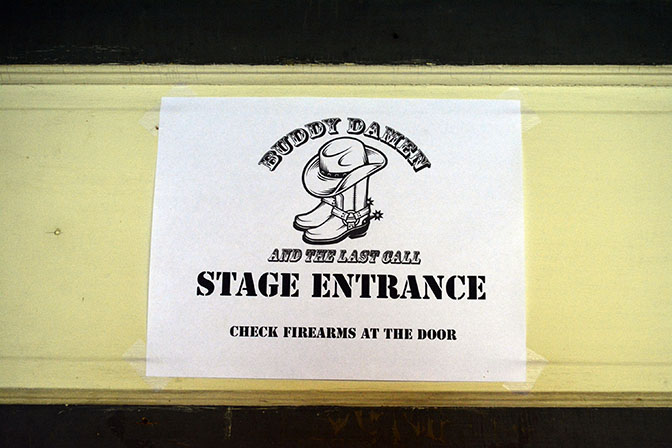
Buddy Damen and the Last Call, Chicago, 2018
Buddy Damen and the Last Call is steeped in myth and ambiguity. Can we begin by discussing the background of this fascination of the band? How does this pursuit and yarn assist in defining the band?
Duke: This really all started as a joke. We were playing in a small bar on Damen Ave. We were not even a band yet. Just a few people that got together to play. As we finished playing, one of the two customers in the bar said “Nice job, what’s the name of your band?” Before I answered, I asked him if he had a dog as a kid. He said “Yes, Buddy,” and I responded, “That’s the name of our band. We are Buddy Damen and the Wallflowers.” We had a good chuckle at that. I went home and created the Fictional Story. Casie came up with a photo (her uncle) that fit the story really well, and it just snowballed from there. We later changed the name of the band to “Buddy Damen and the Last Call” to fit the story.
Snickers: The myth is a fun way to bring us all together. I think the myth is giving us courage to be creative and take some chances some of us may never have taken.
Troy: It builds a familiar structure for us as a band. Before I joined this band, I only knew Mark and Robbie. Having a band myth helps gives us all a common background and lets us have some fun with one another, even though we do not share such a history in reality.
Poochie: Myth is central to everything we do. We create stories about who we are and what we believe, and that allows us to create an identity and move in the world. When you allow yourself to play roles, even in small ways—dressing up, imitating somebody else, deciding on a whim to take dance lessons—a truth emerges that wouldn’t otherwise emerge. There’s a saying that fact is stranger than fiction, and I think it is, because fact is not bound to having everything fit together in a way that fiction is. The other side of the coin is that fiction can be more real than reality.
AJ: I don’t think the myth is THAT important. However, I do find it a bit fun to have a lore behind the band. It’s an interesting tidbit that fans of the band may get really into. Half the time, I forget we have a myth.
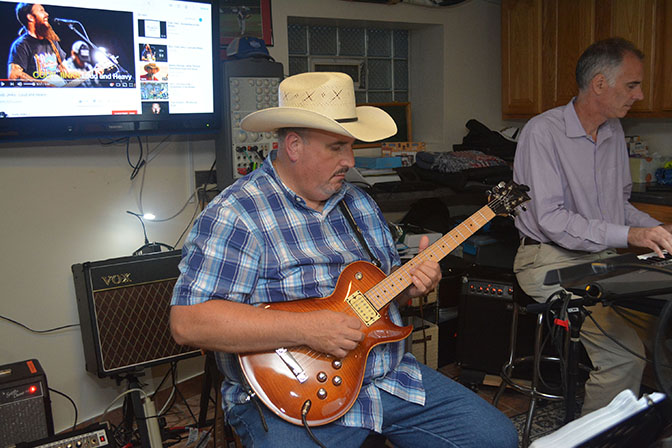
Duke Kostner, guitar and vocals, and Poochie Wolcott, keyboard, Chicago, 2018
How’d y’all come together as a group? Were there specific sonic elements and styles of play that you sought in the members?
Duke: It all basically started at Old Town. The core members of the group were all taking lessons and playing in ensembles. Mike, Casie, Nicole, Robert, and myself. I was in a few classes with Casie and Nicole, later I met Mike at some open workshops.
Snickers: Nicole’s been MIA for a while because she’s been in a caravan traveling west with her guitar.
Charlie: I’m currently off the grid wandering through America’s vast and beautiful national parks at the moment. Been passing through some dusty old towns out West and meeting many generous folks who’ve kept me liquored up and well fed. Not sure when I’ll be returning to Chicago.
Duke: Mike was in a Modern Country Ensemble with Robert. I asked Mike to join us after seeing him play at a bar.
Poochie: I had just joined the ensemble when I struck up a conversation with Mike and he told me how he got together with several people once a week and played in a bar on Damen Ave. I said I’d check it out sometime. A couple weeks later he said they weren’t playing the bar anymore, but they had formed a band, were practicing at somebody named Mark’s house, and asked me if I wanted to join. I was a little dumbstruck at the idea of being in a band. I wasn’t sure if I was in one or not.
Troy: Mark is the father of my brother’s fiancé who I have known for almost a decade. He knew I played the drums and wanted me to join. Since I was currently on hiatus with my other band, I was enthusiastic about being able to broaden my genre drumming as well as wanting to play in front of others again.
AJ: Had a reconciling with my brother Myrtle [Troy] and he asked me if I wanted into something bigger than myself. In reality, I really wanted to play in a band as my primary was on hiatus, and while country isn’t necessarily my thing, it’s grown on me and I like to be rounded in music.
Monte: I think I just stalked everybody until they let me in.
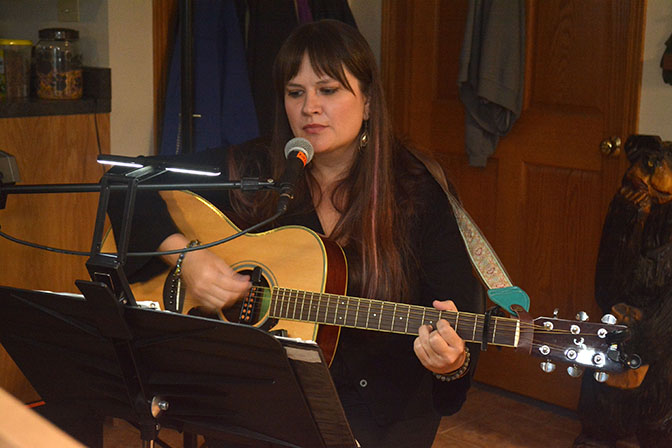
Snickers Sunnyside, guitar and vocals, Chicago, 2018
Each member has two identities, one for the stage, and another for the day-to-day. Can you walk us through the process of selection? How does the stage name identity differ from one’s original personality?
Duke: As silly as this seems, our “Stage Names” are the names of our first pets (first name) and the streets where we live (last name). In Rob’s case, Augustus T-Bone Jackson just seemed to fit.
AJ: I’m a man of a million names—T-Bone as a child (voracious appetite), AJ when I was a bit older, Auggie for my sweethearts. I generally float now between AJ, Gus, and August.
Duke: Since Mike didn’t have a pet, his first name Monte is after his first car.
Monte: 1973 Monte Carlo with round headlights in front. Didn’t have shocks. When you stopped, the car would keep bouncing.
Poochie: The stage names free us a little from having to be bound to what we think of ourselves or what others thinks of us.
Troy: Having a stage name or personality allows us to be heightened versions of ourselves. We can move out of our comfort zones, and not necessarily be somebody we are not, but be another version of ourselves.
Monte: I think it’s an avenue we can explore. It certainly lends itself to creating almost like a façade, if you will.
Snickers: I think it allows for a bit of fun to be poked at ourselves and for us not to take what we are doing too seriously.
Poochie: How does Poochie differ from Robert? For now, I’ll say this: Robert likes bourbon. Pooch drinks it.
Duke: Duke Kostner has a full head of hair and he’s only 180 pounds. He’s a damn good looking man. That’s all I’m going to say. He’s a handsome, handsome man.
AJ: A stage name allows me a way to separate a fuck up (which is rare) from Robbie the person to AJ the character. Otherwise, they’re the same person.
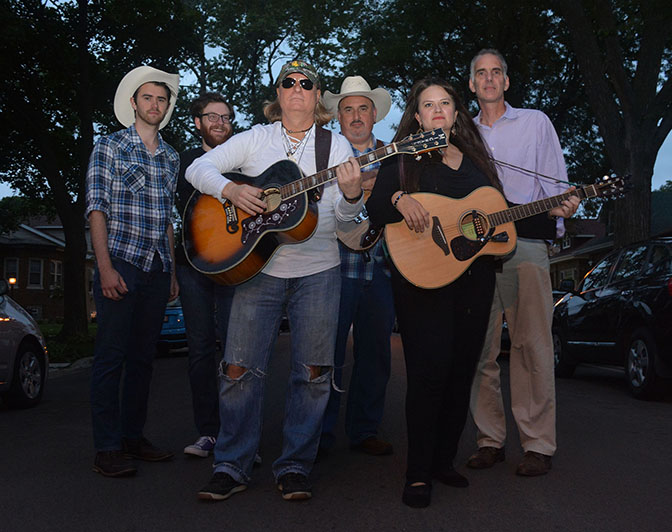
Buddy Damen and the Last Call, Chicago, 2018
Your set list and musical scope is fairly vast, but centers upon modern country, folk, and blues music. What’s the sonic focus of Buddy Damen, and what do you hope the audience takes from your music?
Troy: I don’t know if I’d say it’s modern country.
Snickers: No, it’s not modern country.
Troy: If anything, I’d say it’s country music that’s older.
Snickers: Right.
Duke: And even our original stuff, it’s really hard to—
Snickers: Pin it down.
Duke: My stuff is probably easier to pin down what it is.
Snickers: Yours is very country.
Duke: Yeah.
Troy: I would say that the ones that Mike writes are more modern—if we’re going to call it modern—country. Casie’s are more like folky, bluesy kind of sounding songs. Everyone has their own different style.
Duke: We’re really like a bunch of different singer-songwriters that pulled together. And it works.
Monte: Anything we hope the audience takes from our music? For me, I just hope they enjoy it. Whatever it is for them, I hope they enjoy it. I hope they interpret it in their own way, and enjoy it.
Snickers: I also hope we have enough variety in our music that there will be something for everyone in the audience. I hope they can take away something from what they’ve heard.
Troy: I hope they take whatever they want from our music. The beauty of music is that everyone interprets the songs in their own way. Whether it be how it makes them feel, or how they can relate to it. I just want our audience to enjoy our music in their own way.
AJ: I don’t really care what they take away from seeing us play, they like us or they don’t. When I play for people, it’s because I enjoy it and want to share my joy with people.
Duke: I think it is just us being who we are, telling our personal story and hoping that people appreciate the honesty and the effort.
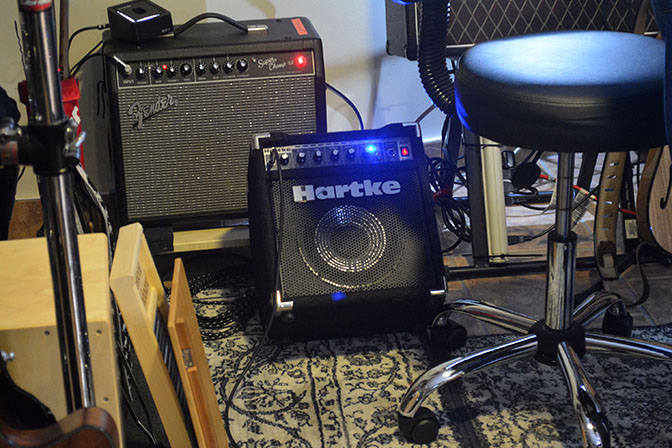
Buddy Damen and the Last Call, Chicago, 2018
Can you walk us through the composing of one of your more developed original songs? Is this built around narrative or visceral experience? Is there specific content the band is exploring in their music?
Duke: Since the core of our band started at Old Town, we share the music that is commonly played there. It would seem that at its core, folk, rock, country, and the blues influence us all. We seem to be able to find common ground.
AJ: I view music as a very intimate and collaborative thing. I never learned theory, barely know the notes on the neck of my bass, and can count on two hands how many scales I know. I generally have a half-baked idea of a riff or something and bring it to people and see what they come up with and go back and forth until the song dies out of a lack of a vision or it becomes a beautiful thing and I run with it. I don’t like thinking about what to play; I like to think, does this sound good and is it what I want the song to feel like?
Duke: For me, a song idea pops in my head and generally, I write the lyrics within an hour. Then another day to put music to it. Then I will ask for input from the band. My biggest struggle is that sometimes a song is just too personal and you fight yourself with whether or not you want to share it. It really is putting yourself out there.
Monte: When I come across something I hear and like, I write it down. And then as I’m writing, I’ll come up with an idea, use some of those cool sayings, if you will, to enhance what I’m doing. That’s one portion of it. The other portion is just experiences and life in general. Things that I see around me.
Poochie: There are ways you put things together just to see what happens. Maybe it’s trying a particular note over a particular chord. That experimentation helps root you in the technical aspects of what you’re doing, and it sparks ideas about other things you could try, opens paths you can begin to follow. There are also things you intentionally set out to do—you want to make an argument that is important to you, you want to bring someone who is far away closer, you want to describe the rain—and you try to find ways to do those things with the tools you have. Creatively, I think both the wandering and the clear intention are important.
Troy: I approach the music I create to make me have an emotional reaction to it. Being the drummer, I do not write lyrics all that often; however, there are times when I have a moment where I have this emotional resonance and I can write a whole song in 15 minutes. I look for those moments in my writing.
Snickers: For me, it’s personal. Whatever I’m feeling in the moment is what I write about. Shout Over Sinners came about because I was pissed off about what was going on at the border. That one’s like a protest song. My other song—a guy broke up with me the week before, so I wrote a song about it, because I was upset.
Troy: It’s all ways to vent really.
Snickers: Yeah. Exactly. Especially when there’re jerks involved.
Duke: Why don’t you write a song about all the other men in your life? Your bandmates?
Snickers: You’re not jerks.
AJ (imagining song): Fuck you, fuck you, fuck you . . .
Duke : The song’s going to be “Asshole 1, Son of a Bitch 2, Motherfucker 3, I Want Him Dead 4.” Kind of along the lines of “Wife 1,” you know?
Poochie: And it’s going to be plaintive and mournful.
Snickers: That’s right. It’ll make you cry.
Duke: The song will be five verses. Each verse will be how she killed us.
Snickers: That’s a great idea for a song.
Troy: After each verse, we all drop off.
Snickers: No, that’s a really great idea for a song. [writing] Each verse . . . Murders a member of the band.
AJ: Successively, every member of the band either falls to the floor or walks off stage.
Snickers: And it will end with just me. Everybody else will be dead.
Duke: I’m a little afraid now.
Snickers: Of?
Duke: You just got done saying you write from real life. So I don’t know how to put these two together.
AJ (to Duke): You’ve lived a lot longer than I have, damnit.
Snickers: I’m loving this. I may only do three verses and kill two people in two verses, and one person in one verse. And there’ll be a chorus.
Duke: You just got done talking about how you write from reality, and now you’re talking about killing us all.
Snickers: I mean, could you really see me hurting anybody? Honestly?
Monte: You can kill me with kindness.
Troy: Here’s the thing. If it’s going to be reality, at least we’ll know how she’s going to do it.
AJ: In the middle of the verse, she’s like, “And I poisoned your whiskey!”
Duke: Send us the lyrics first, will ya’?
Snickers: A couple of you do drink whiskey.
Duke: Last time I do a shot with you.
Snickers (to Poochie): You drink whiskey.
AJ: I’ll start bringing my own whiskey.
Snickers: Oh my god, this is hilarious.
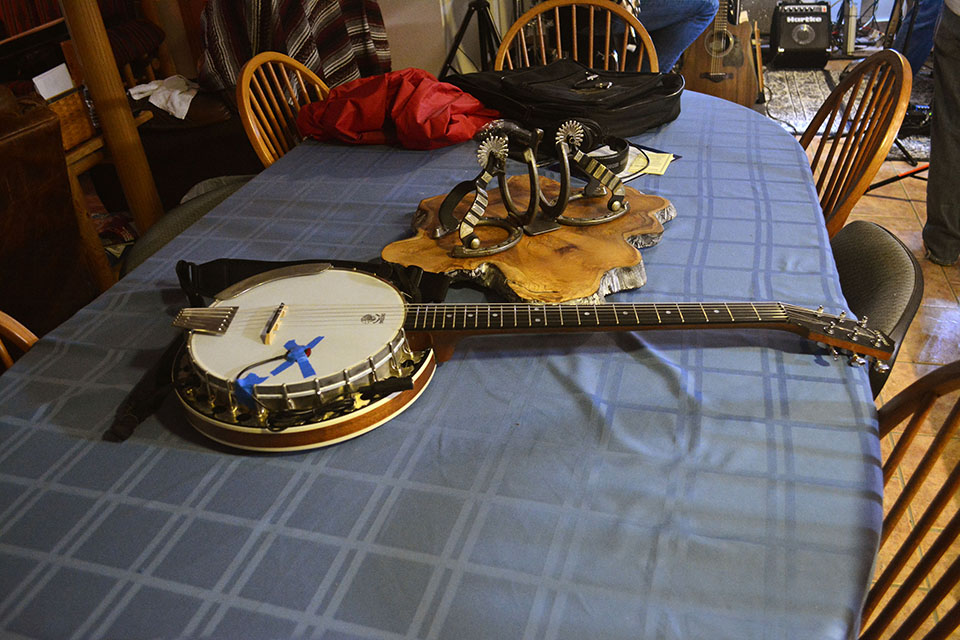
Buddy Damen and the Last Call, Chicago, 2018
You are currently producing songs to be recorded. Do you have a title for this venture? Any timeline for recording?
Poochie: Timeline for recording would be before Casie gets this next song written.
Duke: Our first recording will probably be self-titled. We have album art decided upon. It’s the picture of Buddy Damen you see on the home page of our website.
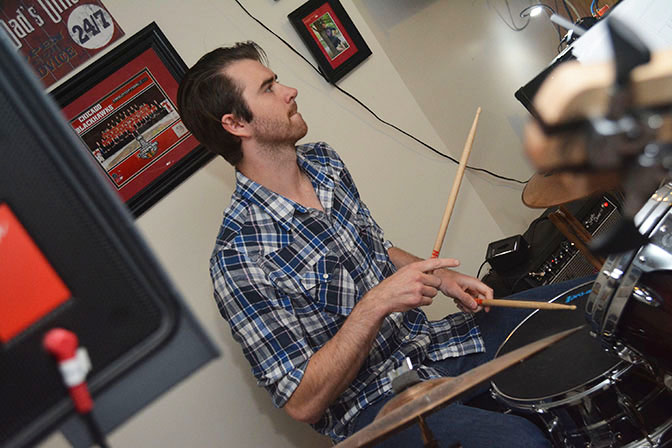
Troy Myrtle, drums, Chicago, 2018
What’s the plan for the remainder of 2018? Any upcoming shows? Mythmaking on the horizon? Bars to visit? Mischief to be gotten?
Snickers: There’s always mischief to be gotten.
Duke: We’re having a small backyard concert at my house this October to introduce our band to family and friends and generate some buzz. And we’re planning to submit to play the Square Roots Festival next summer. That’s a gig at Old Town where they block off Lincoln. There’re four stages—two outside, two inside.
Poochie: A couple of us have started playing at open mics together. We haven’t yet played as a whole band at an open mic, but we’re moving that direction.
Snickers: My hope is that we begin playing out on a regular basis and we all become more comfortable in who we are as musicians and we continue to grow as musicians.
Troy: I would like to see us playing in front of an audience and having a great time. Playing live in front of those who enjoy your music is one of the best feelings in the world, and I would love to see us do a lot of that in the future.
Monte: I’d love to cut that album. We don’t have to win awards or anything like that, we just have to enjoy what we’re doing. And if no one else likes it, I’m cool with that too. I don’t care.
Poochie: I’m interested in the original material people are working on. I think we’ve got some good songs and more are in the pipeline. I’m also curious what we’ll find out about Buddy Damen and who he is. I think there’s a lot to learn.
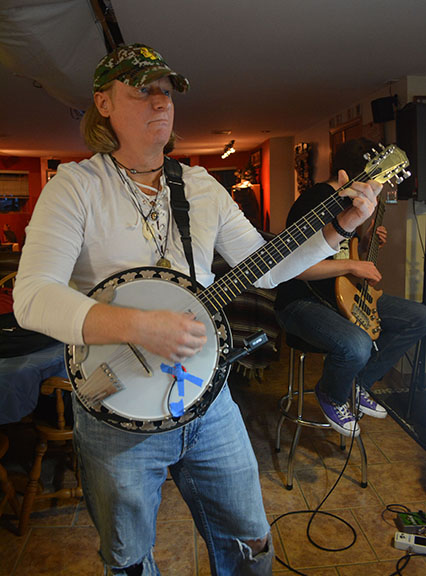
Monte Vine, banjo and vocals, Chicago, 2018
For additional information on Buddy Damen and the Last Call, check out:
Buddy Damen and the Last Call – https://www.buddydamen.com/
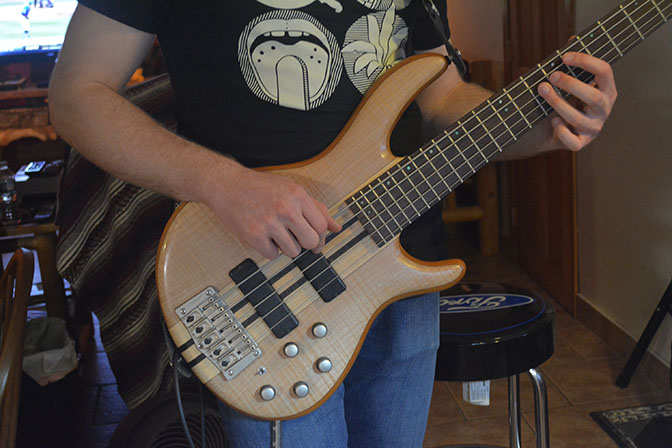
Augustus T-Bone Jackson, Chicago, 2018
Interview and photographs by Chester Alamo-Costello


